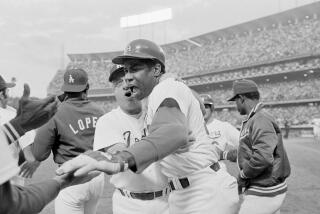Rader Back in Texas, but Doesn’t Find Many Happy Returns
- Share via
ARLINGTON, Tex. — As triumphant returns go, Doug Rader’s managerial comeback Monday evening lacked but one vital ingredient:
A triumph.
Not that Rader had much to do with the Angels’ 4-0 loss; he didn’t. Confined to the visitors’ dugout, Rader had to watch his former Ranger team beat up his former No. 1 starter, Mike Witt, who no longer can be considered the best and brightest of the Angel rotation.
On Monday night, as Witt struggled through his 95-pitch, six-inning stay, you wondered if he had become a liability. Then you wondered if anyone on the Angels is thinking the same thing.
Adding to Rader’s miseries was a miserable Angel offense. Blame Witt for three of those four runs, but blame the puzzling un-offense for a fifth consecutive Angel loss. Against the eminently hittable Mike Jeffcoat, who began the game with a 5.00 earned-run average, to say nothing of the robust .351 opponents were batting against him, the Angels could manage just one scoring threat--and bungled that one with questionable baserunning.
So it was of little surprise that Rader considered his homecoming of sorts a non-event. He had more important things on his mind, mainly how to get the bilge pump working on a leaky Angel ship.
“I would much rather be invisible,” he said. “I’d rather go out and do my job than do all this. But I understand (the attention is) part of it.”
Rader managed the Rangers for 355 games, plenty of time to display a hall of fame temper, a lack of tact and a low tolerance for losses, of which there were 200. His disposition began at cranky and grew worse as the losses and criticism mounted.
Shortly after the start of the 1985 season, he was fired and Ranger fans heaved a sigh of relief: “Darth Rader” was gone. And maybe it was no coincidence that Ranger management hired the bubbly, hyper-enthusiastic Bobby Valentine, a public relations man’s dream, as the next manager.
“I like Doug,” said pitcher Charlie Hough, one of only four Rangers remaining from the Rader regime. “On the personal side, he treated me great. He let me pitch and he handled me fairly well. That side of it was fine. I just didn’t think he did a real good job of managing the team, but we didn’t have a very good team, either. It was the kind of situation where he didn’t have much chance of doing real well, but I think he could have done better.”
Rader’s faults have been well-documented. He bullied players, didn’t get along with the local media and took every loss as a personal affront. He managed like he played--with passion.
“We didn’t get outmanaged, we got outplayed and Doug got upset,” Hough said. “He brought a lot of the media heat and attention to himself and that’s how you get fired.”
Ironically enough, Rader is in a situation that parallels the events of 1983, when his Ranger team bolted to a 44-33 start before wilting in the second half and finishing 22 games out of first place in the American League West. This time it is the 1989 Angels who have begun the season with an unexpected fast start, only to hit the inevitable skid.
Predictably, the focus isn’t so much on the Angels as it is on Rader. The countdown begins on the return of the fabled Rader temper.
Keep counting, Rader said after consecutive loss No. 5; he is long since cured of tantrums.
“You ought not be concerned with me,” he said, “I’m not going to be an issue.”
It’s only fitting that Rader make this declaration while sitting in Arlington Stadium, site of many an outburst. This is where he realized, a little too late by Ranger calendars, that patience is a virtue, not a weakness. This is where he vowed to amend his ways.
At last look, even in the midst of this Angel slump, Rader remains true to his word. He isn’t pleased by the losing streak, but at least no one is fearing for their lives or jobs, as they might have during the pre-Decent Doug Era. “It’s not the end of the world anymore,” he said. “(Losing) still hurts--don’t get me wrong--but I think I’m a little better equipped to handle it now.”
Not everyone is entirely convinced.
Buddy Bell, another alumnus of the Rader reign of Texas terror, said he’ll believe it when he sees it--again and again.
“If I know Doug, I don’t think Doug’s changed very much,” he said. “Doug’s a very sensitive person, a very emotional person. That’s probably one of his problems. He felt responsible for every little thing that happened.”
No longer. Now he delegates authority. Seething is low on Rader’s list of priorities.
Bell did allow that Rader is “a very intelligent guy” and that he surely “learned from past experiences.” But after what happened to Bell back in the early ‘80s, you can understand his hesitation to declare Rader a changed man.
“I’ve (had) so many first-year managers and all of their characteristics are that they’re afraid of failure, of getting fired,” Bell said. “They tend not to let anything slide, even petty things.”
At the moment, Rader is letting most everything slide, including an opening-day pitcher who is struggling and a team that can’t buy a win if it were on sale at the concession stand. Any more understanding and you’d put a priest’s collar around his neck.
So maybe it wasn’t the return to Arlington that Rader was hoping for. His Angels lost again, but in a wacky, poetic way, Rader emerged a winner. Like the man said, you ought not worry about him--he’s not going to be an issue.
More to Read
Go beyond the scoreboard
Get the latest on L.A.'s teams in the daily Sports Report newsletter.
You may occasionally receive promotional content from the Los Angeles Times.






